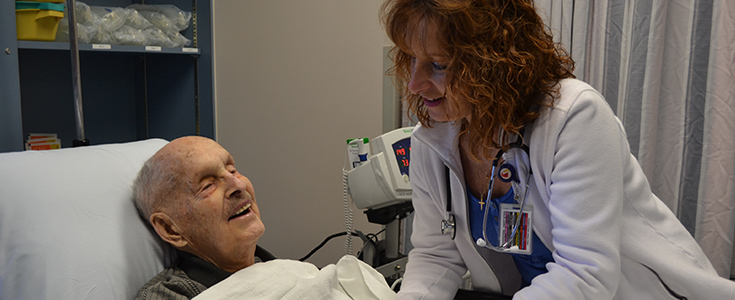
There's something about a Manitoba winter that turns us inward, makes us reflective. As we look back on the year gone by in health care, it's fair to say 2017 was defined by great change - profound, fundamental, disruptive change. And at the center of it all, were nurses.
While most of us agree that the health care system wasn't working, the type of change required and the manner in which those changes should occur has been subject to debate. That's a good thing. Open, honest dialogue is both fair and healthy, and we should never shy away from opportunities to share our perspectives, constructively and productively. It's the only way we'll move forward in the best interests of patients.
Reflecting on changes
Going through staffing and scheduling changes was not easy and was particularly difficult for some. There were impacts for nurses changing roles, schedules and in some cases location.
To make the necessary changes 2,297 nurses received deletion notices and 70 of these, or 3% resulted in lay off. Of these 70 affected nurses, all but 31 have since secured a position. Many of the 31 nurses have been able to pick up shifts while in lay off up to their pervious EFT, and some nurses have been able to pick up shifts exceeding their previous EFT. Last week there were 99 nursing positions posted; there are opportunities.
The WRHA is committed to there being a job for every nurse who wants to stay in the WRHA.
It is also important to cultivate the capacity to be resilient. Being resilient is having the ability to bounce back in the face of challenge or adversity, but to also use those moments of stress or challenge to learn and grow. Contributing to and receiving form strong support systems and engaging in meaningful activities are a couple of ways we can build our resilient muscles.
One thing we've debated most vigorously over the past several months is the move to standardized models of care. I appreciate the difficulty some have with the term. The biggest roadblock for implementing a standard is the dichotomy the word itself implies. As an adjective, "standard" is defined as "accepted as normal or average, not special or exceptional" - completely counter to the way we see patients. Taken as a noun, however, the meaning changes: a "standard" is "a level of quality or attainment, an idea or thing used as a measure, norm, or model in comparative evaluations". Now that's something we can get behind.
As nurses, we are educated, thankfully, to see patients as people, unique and real. In all we do we are driven to avoid cookie-cutter approaches that may suit administrative purposes while ignoring the person we serve. It is that perspective, understandably, that creates a reluctance to implement solutions that seem to make no allowance for nuance or need. Some would say standardization could limit our field of vision such that it becomes difficult to innovate and improve, that it inhibits our scope of practice, that it suffocates creativity.
I hear those concerns. After all, the point of clinical consolidation is to set the stage for improvement - and we aren't going to get it if nurses can't contribute fully.
So how would standardized care permit the level of autonomy, creativity and humanity that defines the practice of nursing, and how would it create the conditions in which those attributes could actually thrive? Here's how I see it:
For too long we've relied on nurses and other health care professionals to find the path forward on their own, every day and with every patient, with little or no framework within which to assess, evaluate and refine our work. That's extremely stressful, and isolating. The essence of standardized work is to collaborate - health leaders, clinicians, and patients alike, to establish context-specific consistent processes that respect, and optimize, the contributions and perspectives that impact care. That consensus is critical, building standards that guide, rather than dictate, our practice.
What we're really talking about here is not "standard" practice, but "consistent" practice. Safe and effective care is dependent on the knowledge, skills and behaviors of direct care staff, all of which is informed by evidence. These are the bones, the framework for care systems that can be assessed, evaluated and improved upon in ways that strengthen individual and collective practice. Rather than static, the framework is the subject of analysis and comment with the goal of informing and continually improving the care we provide. It's a dynamic environment where we can create clear pathways to care, eliminate unnecessary work, and free up clinicians to explore options and tailor their care for individuals.
A key benefit of working from a common, consistent understanding is the ability it permits us to measure outcomes and adjust approach accordingly. Standards, as set out in legislation and bodies such as Accreditation Canada, provide a guide to monitor our performance, but they don't limit our unique ability, as nurses, to use clinical judgment to define new approaches to care. In fact, they may be exactly what we need if nurses are to fully explore their scope of practice.
Personally, I believe the application of standardized care is important, now more than ever. Nurses and other care providers are often stretched, designing work-arounds to make a flawed system respond to patients' needs. It's exhausting and wasteful.
Like 2017, 2018 will be a year of change, perhaps more so than the year before. But if we work together, collegially and collaboratively, we can emerge having created a health care system that delivers for the public and staff alike. We need to address systemic impediments to quality care, and establishing evidence-based standards is a good place to start.
New Grad Day for Nurses January 26, 2018

For the event poster, click here.
For registration information, click here.
Organizational Change Management Reference Sites
- https://extranet.manitoba-ehealth.ca/rmp/OCM/_layouts/15/start.aspx#/
- https://extranet.manitoba-ehealth.ca/rmp/OCM/_layouts/15/start.aspx#/Resources
